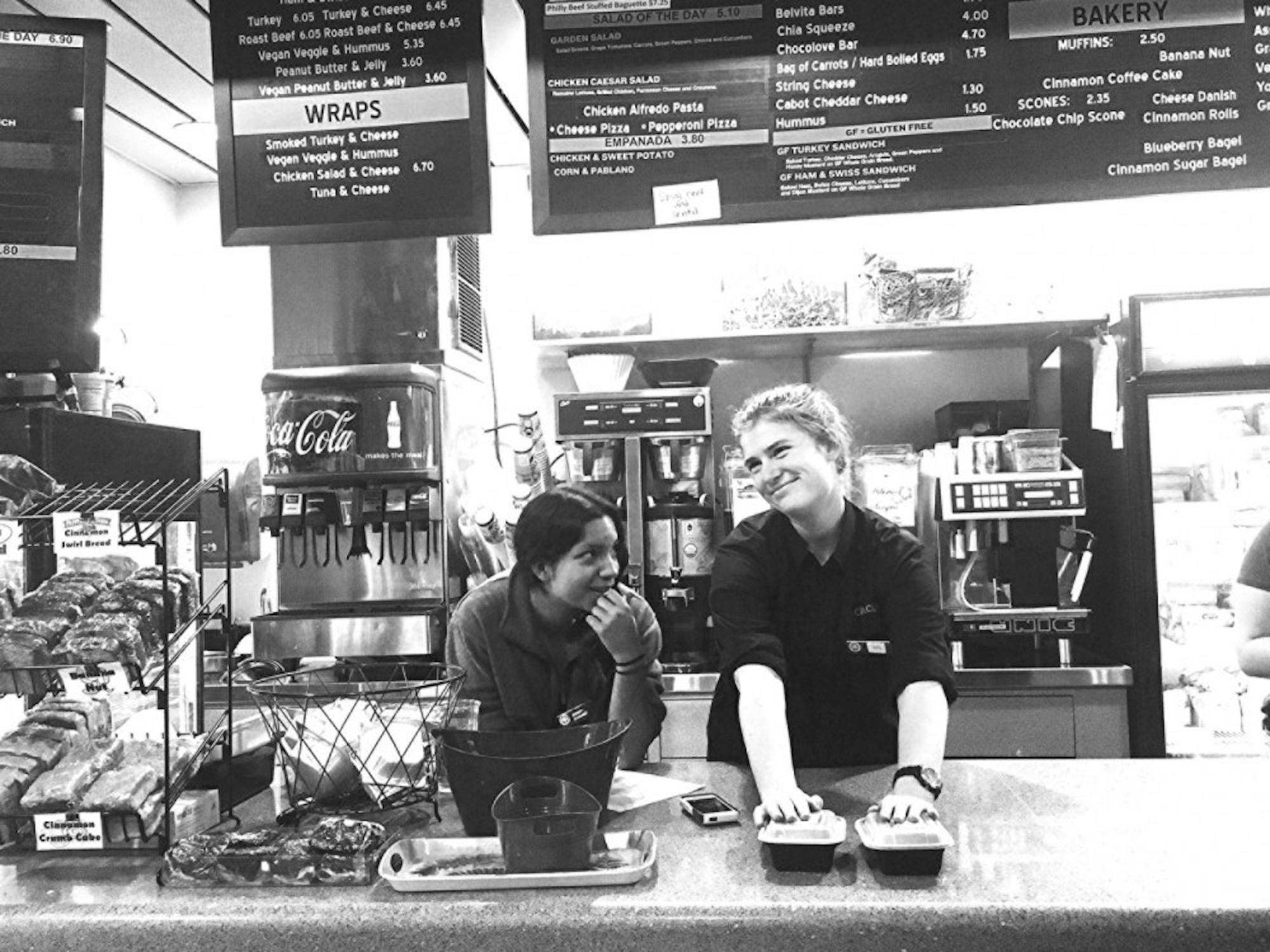For over 6,000 students, Dartmouth College is the institution to which they pay tuition and from which they receive an education. But for many of those students, the relationship is a little more complicated. These students pay Dartmouth, but Dartmouth also pays them — to work.
Yumi Naruke ’20 spends a combined total of about 40 hours each week working as a dishwasher in the Class of ’53 Commons dish room, as a ticket seller for the Hopkins Center and as a tour guide for the Office of Admissions. “I’m SO busy” is an oft-repeated complaint at Dartmouth, but Naruke, who works the equivalent of a full time job while taking a full class load and involving herself in extracurricular activities (and sleeping, on occasion), truly understands the meaning of the word.
“There aren’t enough hours in a day or week to make up for the hours I spend behind the computer in the box office or cleaning plates in the dish room,” Naruke said.
She doesn’t feel like her grades have suffered due to her busy schedule, but she does feel like she can’t fully participate in the campus social scene; time that she could spend with friends she instead spends rushing from work to class to the library to work, leaving her exhausted and stressed.
“Many of my friends have observed that my schedule is always too full and that I often seem stressed,” she explained.
Naruke’s case is unusual; on average, student employees work about 10 hours a week. This more manageable time commitment can provide structure to students’ days: Dartmouth students, with only three classes, have unprecedented freedom in designing their schedules. Heidi Ahn ’18, who works three two-hour shifts at the Allen House snack bar each week, finds that having a job has helped her organize her time.
“I work better when I have a lot of things going on because it’s easier for me to manage my time, so I feel like having a job on campus has given me a little more structure,” she said.
Ahn loves her job, which involves scanning students’ purchases and restocking shelves. She particularly enjoys the opportunity she has to meet students she would not have otherwise gotten to know. Because House Center B is so centrally located — close to the library, the Green and Webster Avenue — she gets to interact with a fairly representative cross-section of Dartmouth’s student body.
Elisabeth Sanson ’20 has also enjoyed meeting new people through her job at Collis Market. She says her favorite part of her job has been hanging out with an older employee named Nancy who lives in the Upper Valley. The two have become very close; Sanson said Nancy is sure to keep her updated on personal life and family drama.
“I never would have gotten to meet Nancy without my job, and now I would definitely count her as one of my best friends,” Sanson said.
Working at Collis Market has also taught Sanson to appreciate the value of money.
“I don’t go out to eat as much because I just spent an hour stocking raspberries; I don’t want to spend it all on five pieces of sushi,” she said.
Naruke also understands the value of money; she chose to work for Dartmouth Dining Services specifically because of the relatively higher pay, something that was attractive to her given Dartmouth’s oppressively high tuition rates.
“Helping my parents pay for my education is a responsibility I feel that I have coming from a low-income background,” she said.
That being said, she wishes that she didn’t have to feel embarrassed to work for DDS. She feels that a certain stigma is associated with working for the College’s dining services.
“The best way to describe this stigma is the shame I feel for some inexplicable reason when I tell someone I work in the [Class of ’53 Commons] dish room,” Naruke said. “Oftentimes, the response will be a grimace or a sympathetic look with maybe an ‘Oh ... I’m sorry.’ People tend to think that DDS workers are so desperate that they will subject themselves to ‘lowly’ work for pay, but DDS pays well and allows students to make money efficiently: less time, more money.”
Sanson said that she also deals with stigmas, albeit of a slightly different nature.
“People think you don’t do anything [working at Collis Market], but it is a lot of work,” she said. “It’s an actual job.”
It frustrates Sanson that fellow students view campus jobs as lesser than jobs in the “real” world, assuming that student workers spend their time getting paid to do homework. She is responsible for answering customers’ questions, scanning items and stocking shelves, much like an employee in a “real” grocery store.
According to Ahn, her job is much more than sitting at a counter and scanning food items.
“What I think is especially interesting about the snack bar is that it’s all student-run: pretty much all of the students order the food and there’s just one overhead supervisor,” she said. “I think it’s pretty awesome that we’re running our own DDS operation for other students, and we are students.”
People like Naruke, Sanson and Ahn are not only students, but also entrepreneurs, peers and employees whose responsibilities extend far beyond note-taking and problem sets.




